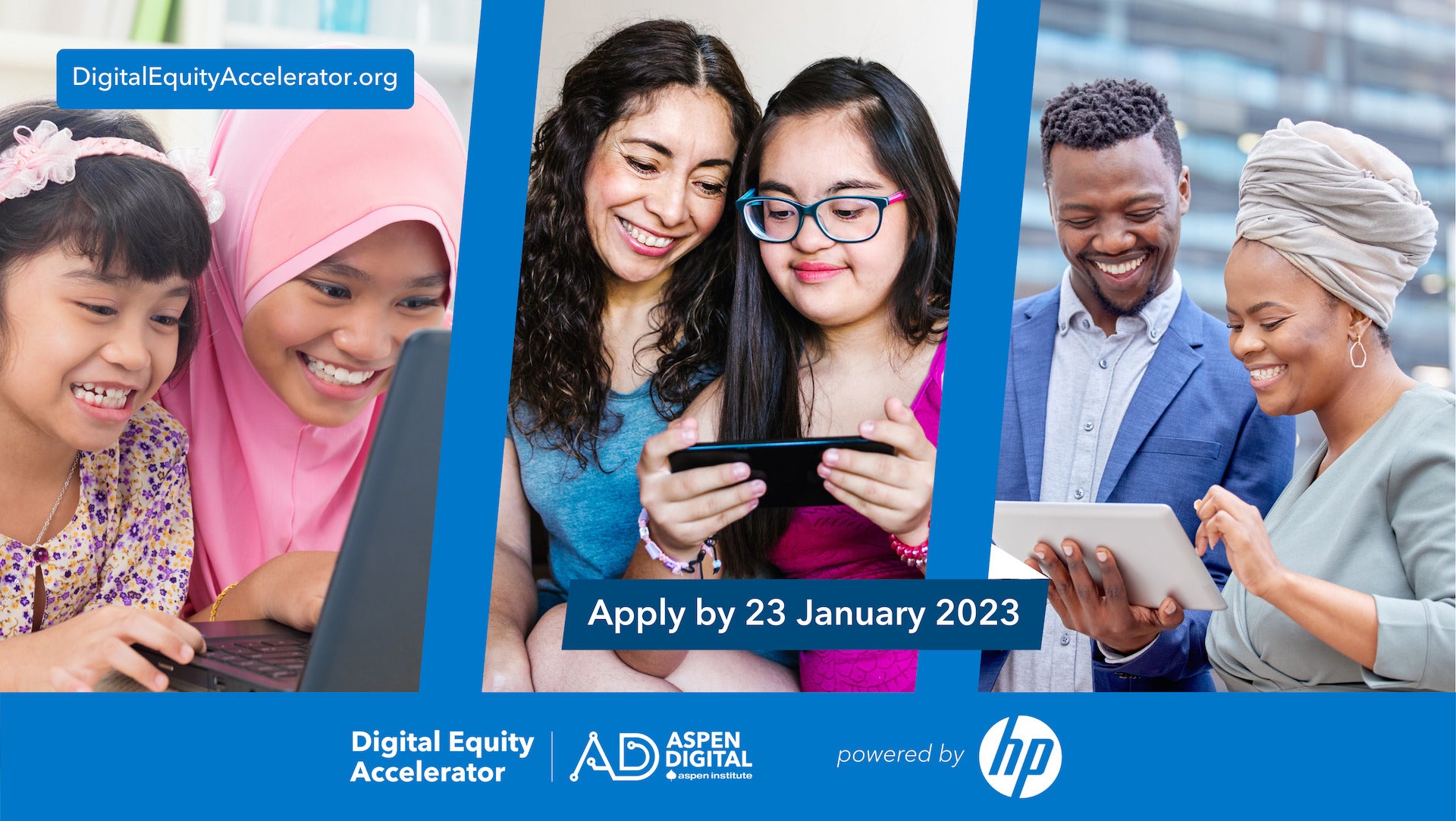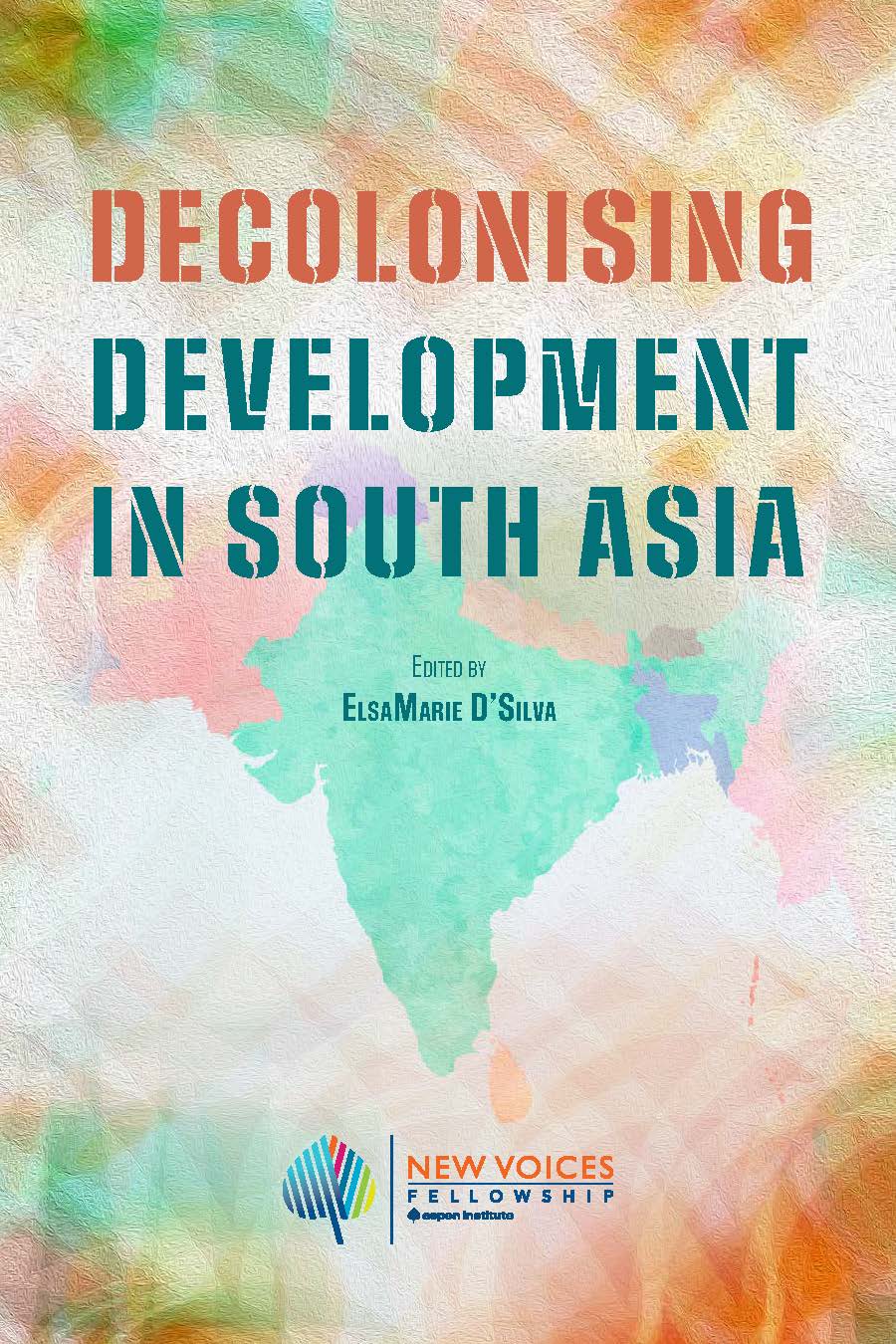Member organizations of the Aspen Network of Development Entrepreneurs believe that small and growing businesses will be the best drivers of prosperity for the poor in developing countries—creating jobs and providing basic products and services that are often lacking in emerging economies. With 20 staff members spread across seven countries, ANDE supports thousands of entrepreneurs in some of the most challenging economies in the world.
Like many successful start-ups, ANDE began with an idea—over cocktails. It was 2006, and leaders of organizations like TechnoServe, Acumen, and Endeavor had noticed a stark lack of collaboration among organizations that aim to help small businesses in developing countries. These nonprofits were making pioneering investments: supporting water and sanitation businesses in India to increase access to clean water, training managers on dairy farms in Nairobi to produce safe and high-quality milk products, or building technology-based education businesses in Brazil to increase access to low-cost educational services. They established satellite offices and hired local staff in emerging markets rather than send in American consultants to address local problems. These nonprofits had similar goals and shared similar values. But they weren’t working together.
The leaders of these groups included Peter Reiling, an executive vice president at the Aspen Institute who at the time served as CEO of TechnoServe. Involved in the Aspen community since 1998, Reiling knew the power of the Institute’s neutral gathering spaces. In 2006, he hosted a meeting at the Institute’s Aspen campus to find common ground among the organizations, recruiting attendees from global development nonprofits, government agencies, Fortune 500 corporations, and leading philanthropic institutions. “We sought out individuals who would be willing to ask, ‘What would it take to have greater impact together?’ ” Reiling says.
The microfinance movement was gathering steam, and the leaders who would become the founders of ANDE believed that the development of competitive businesses was a critically important response to the stubborn fact of global poverty. They still do. Ending poverty starts with creativity, with an entrepreneur who builds a business that serves customers, creates jobs, and raises incomes—all of which address critical social problems.
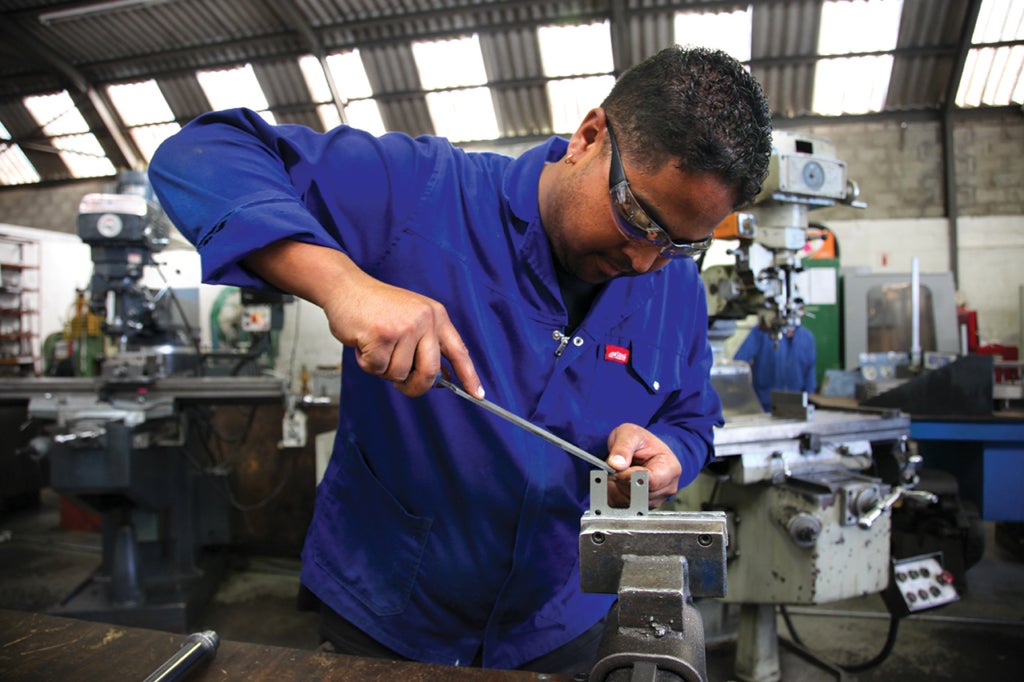
An employee on the Dramco tooling floor in Cape Town, South Africa. ANDE member Swisscontact provides business-development services to the organization.
With seed funding from a handful of leading philanthropic institutions, the Aspen Network of Development Entrepreneurs was born, envisioned as a membership organization whose dues would fuel its expansion. The initial funding allowed for 34 founding members. Philanthropic funding continues to play a key role in delivering ANDE’s trainings, research, and events, and ANDE supplements that funding with annual dues from more than 250 members. “We’ve made strides toward achieving greater economic equality in emerging markets,” says Randall Kempner, executive director of ANDE. “But we have many peaks yet to climb.”
As ANDE has grown, its mission has stayed focused on helping entrepreneurs overcome obstacles to growth in difficult business environments through collective action. The organization serves as an advocate, researcher, adviser, trainer, and promoter for small businesses.
ANDE has also diversified. Small emerging-market investors and researchers work alongside big corporations like Nestle and General Mills to develop initiatives that strengthen small farms, manufacturers, and other small businesses. More than 35 percent of ANDE’s members are based in emerging markets. ANDE now has staff based in Johannesburg, Lagos, Mexico City, Nairobi, New Delhi, São Paulo, and Washington, DC. The member organizations advise businesses like Servals, which provides clean-energy products, including low-cost, energy-efficient cook stoves to poor rural populations in India. Heart Social Enterprise, a former ANDE member, worked directly with Foodtents, a social enterprise that develops micro-agribusinesses to address food-security challenges in South Africa. Dramco Tooling, a manufacturing company in South Africa received advisory services from Swisscontact, an ANDE member, for example.
ANDE researchers are leading the way in understanding the benefits that a business accelerator might have on, say, a female-led start-up in Lagos, by providing training courses in financial management and branding. They host a “Metrics from the Ground Up” conference each summer at the Institute’s headquarters in Washington, so ANDE members can better measure their social and environmental impacts. At the ANDE Annual Conference in September each year, more than 200 members gather to discuss key challenges that impede small-business growth and how to overcome them—like, for example, how members can better recruit and train local talent in emerging cities like Nairobi.
Andrew Stern, the executive director of the Global Development Incubator and a founder of ANDE, says he is amazed at how much traction the network has gained over the past ten years: “In our original business plan, we thought in a few years we might convince 50 organizations to join. Today, there are more than 250! We couldn’t have conceived of that level of interest at the time and from such a diverse set of actors.”
The global organizations ANDE has attracted are no less than a movement—a movement that is trailblazing ways to address the social and environmental issues of our time. Each organization brings a unique approach and diverse perspective to the table. Below are just four.
Lifesaving health care technology
The Lemelson Foundation, a founding member of ANDE, is a private family foundation that promotes invention to solve social and economic challenges. The Foundation creates a pipeline of inventors in both the United States and developing countries who have the ability and knowledge to tackle entrenched issues in creative ways. Unlike many other ANDE members who focus solely on investing in start-ups, The Lemelson Foundation is seeding the technology that businesses are built on from the bottom up. While others focus on developing the latest software or service-based innovations, The Lemelson Foundation is one of a few organizations willing to make investments in hardware businesses in developing countries.
For example, in 2009, the foundation’s longtime grantee VentureWell began supporting Rebecca Richards-Kortum and Maria Oden, the founders of Beyond Traditional Borders, Rice University’s hands-on engineering, design, and education program. Along with a group of undergraduate students at Rice and pediatricians and nurses at Queen Elizabeth Central Hospital, Richards-Kortum and Oden developed an affordable and easy-to-use version of a bubble CPAP (continuous positive airway pressure) machine that could function in a resource-constrained environment. A CPAP machine improves the survival rates of premature babies by using a pressurized mix of air and oxygen to prevent an infant’s lungs from collapsing when they exhale. In areas in Malawi that have the technology, survival rates of premature babies jumped from 24 to 65 percent, according to one clinical evaluation. The device was licensed to a company called 3rd Stone Design and marketed under the name Pumani, or “breathe easy” in the local Chichewa language.
With funding from The Lemelson Foundation, Richards-Kortum and Oden collaborated with colleagues at the University of Malawi Polytechnic, the University of Malawi Medical School, and Queen Elizabeth Central Hospital to establish a biomedical-engineering program to improve health care through invention. A key part of the program focuses on equipping students in Malawi with the skills to create and implement the “Nursery of the Future”—a comprehensive set of affordable yet highly effective neonatal technologies for under-resourced hospitals. The goal is to train students to invent suitable technologies in order to save millions of babies’ lives each year. “With interventions like these,” says Kenneth Turner, a program officer with The Lemelson Foundation, “Malawi can support the creation of new technologies that meet local health needs rather than importing technological solutions from Western countries.”
High-quality biomedical-engineering education is vital to drive these efforts—efforts that, in line with ANDE’s mission, are creating local knowledge and expertise. By investing in students, The Lemelson Foundation is building the future workforce of Malawi while encouraging homegrown problem-solving. Since 2008, ANDE has worked with the foundation to find and invest in local partners around the world and to promote “impact-inventing,” the idea that new hardware solutions and inventions can transform the way the poor live in developing countries, for the better.
Fighting inequality through investment
Promotora Social México is a Mexican venture-philanthropy organization whose goal is to improve the quality of life of the country’s most vulnerable groups through investments in sustainable education, health care, and economic-development businesses.
PSM joined the ANDE network in 2012. With a portfolio of 21 businesses, it selects people and organizations with vision and proven track records. That includes Virtual Market, a social enterprise founded by close friends Andrés González-Cuevas and Jorge Espíndola that addresses the challenges mom-and-pop shops face from the increasing competition of larger convenience-store chains.
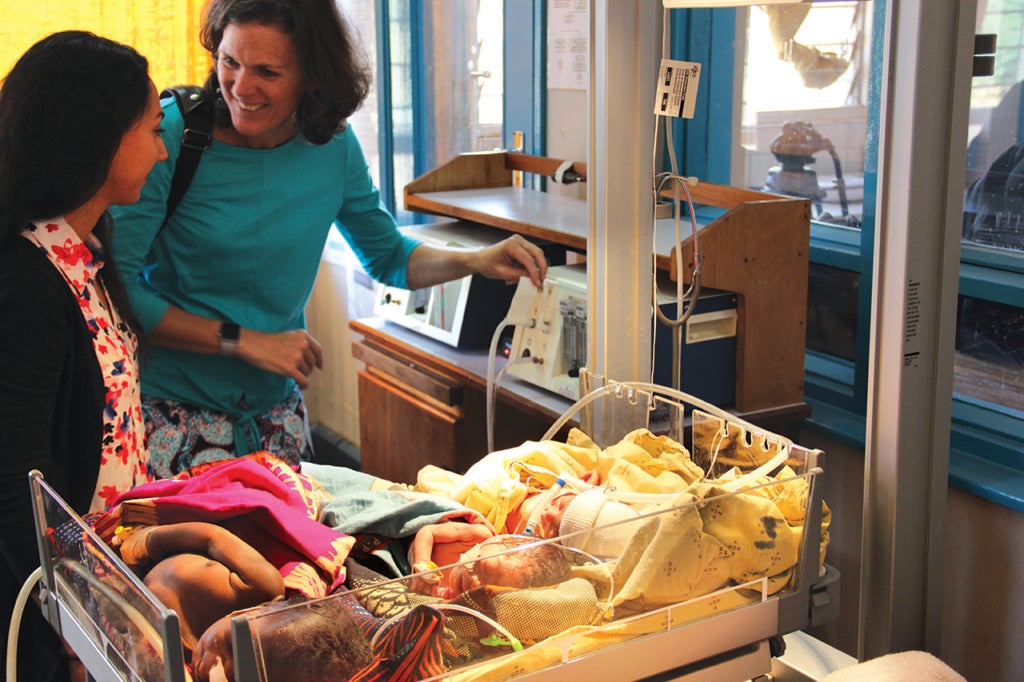
A baby born in a hospital using a Pumani CPAP device.
By offering their customers technological advances, educational resources, and mentorship to help them run their businesses more effectively, Virtual Market ensures that suppliers have instant access to deeply detailed information about how their product performs, like sell-out rates, market share, distribution, price strategy, and promotional effectiveness. Suppliers can access a number of tools designed to improve their product’s performance and to make supply-chain and trade-marketing processes more efficient. On average, each store experiences a more than 23 percent increase in sales and 20 percent more customer traffic thanks to more efficient bill and payment processing.
“Unlike a typical investor,” says Patricia Desentis, a PSM analyst, “social impact is at the core of our investment principles.” With the help of ANDE and its network, PSM has been able to cull best practices from like-minded investors looking to transform the way marginalized communities live, and it has allocated more than $90 million in equity investments, loans, and grants to high-impact health, education, and development projects.
Accelerating business growth in India
Villgro, India’s oldest social-enterprise incubator, nurtures early stage for-profit enterprises in India, focusing on start-ups with the potential to change the lives of millions of urban and rural poor in India. Since 2001, Villgro has worked with more than 100 enterprises, which have gone on to raise over $13 million in follow-on funding and to change the lives of 15 million citizens with their products and services.
Programs led by Villgro are designed to address the major issues early-stage social enterprises face most often: access to financing, talent, and mentorship. When a start-up converts from an informal setting to a professional setup that turns a profit, it needs to professionalize—or die. In India, many entrepreneurs don’t know where to go for nonmonetary support or a seasoned mentor. Sometimes what’s most useful is a connection to an influential network. This is especially relevant in social-impact work, where there is a lot of passion and creativity, but where there are also entrepreneurs struggling to make their ventures commercially viable.
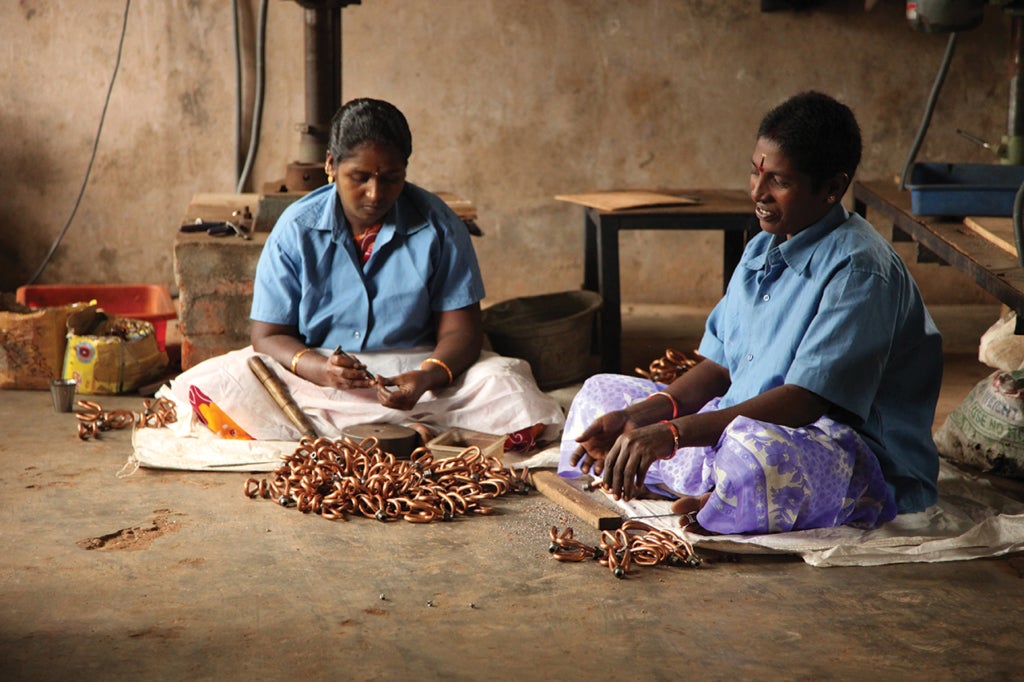
Women at an extraction plant in Hyderabad, India, work with copper chains to create Servals’ clean-energy products.
The companies in Villgro’s portfolio strive to find that balance. For example, there is Uniphore, a company that develops speech-recognition solutions, serves Fortune 500 companies, and also assists rural populations and communities with low literacy rates. Working with World Health Partners, Uniphore’s software system has an information portal that health workers can use through spoken conversation. The speech-recognition software that powers the system resembles a conversation similar to one a patient would have with a doctor or nurse. It’s also personalized to local languages and dialects. The Indian start-up is having a marked impact on the community—while turning a profit.
For Villgro, the ANDE network has played a key role in gathering organizations operating in similar environments but based all over the globe. For example, at the 2015 ANDE Annual Conference, the Villgro team attended a “fail fair,” where participants shared their mistakes for others to learn from—and shared new ideas, too. “The idea of business incubation is still relatively new,” says Aditi Seshadri, of Villgro. “There is a great need to learn from others.”
ANDE has also helped Villgro gain credibility in the eyes of international organizations, leading to increased access to co-investors. During Villgro’s expansion phase, ANDE networks in Vietnam and Kenya provided access to potential investors and talent—quickly.
Transforming African farming
Since its inception in 2002, GrowthAfrica has had one thing in mind: support the rise of a promising continent with a growing, curious, and ambitious middle class by offering tailored programs, strategic advice, and access to local and international investors.
GrowthAfrica was founded by two idealistic entrepreneurs who experienced firsthand the issues that keep African entrepreneurs up at night. Whether partners need someone who understands their customers’ needs, are struggling to tweak their products, or are overwhelmed by new regulations, GrowthAfrica empathizes with and meets the challenges of building a small business in a rapidly emerging market. While Africa is advancing quickly, it’s doing so in ways that are unique to its people, culture, and customs. Rather than imposing Western templates, the advisory firm delivers tailored advice and assistance to entrepreneurs.
For instance, the GrowthAfrica team understands the complexities of customer segmentation in Africa and how to design a supply chain with local realities in mind. Being an ANDE member has allowed GrowthAfrica to better serve partner companies and to stay connected to a broader network—in Kenya, Tanzania, Rwanda, Ethiopia, and beyond. The team has been able to to share stories of how to recruit, develop, and retain its own talent while helping clients do the same. “ANDE has also helped the firm access potential resources with a genuine interest in a unique African approach,” says Johnni Kjelsgaard, the founder of GrowthAfrica.
Ultimately, being a part of ANDE is being a part of a community of people who understand each other, even if they appear quite different on the surface. ANDE members share a similar strategic approach: provide local business solutions to fight poverty—whether they are based in Malaysia or Mombasa.
Kate McElligott is the director of strategic development at ANDE.
